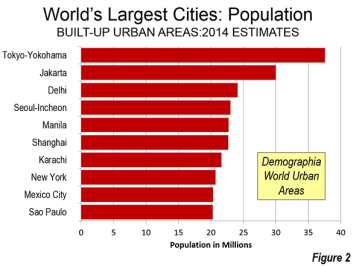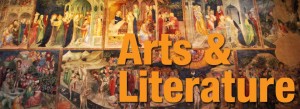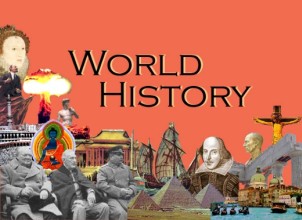8. Christian World View as an Apologetics Framework (iii)
Lesson Objectives
Last week we looked at politics, power & government, education, marriage & family and science, against the background of Christian belief.
This week, we will consider four further, very different, world views in the public square, bringing to twelve (and there are others) the number of spheres of influence that impact us, and should (in turn) impacted by Christians who understand a Biblical world view:
- Environment
- Economics
- Arts & literature
- History
Environment
"The earth is the Lord's, and everything in it, the world, and all who live in it; for he founded it on the seas and established it on the waters." (Psalm 24:1, 2)
The world's population has passed the 7 billion mark and we are witnessing the impacts of man on the planet. The state of the environment is uppermost in the minds of many leaders, scientists, opinion makers and communities around the world. Environmental movements are political forces. While some opinions are polarised, there is no doubt that the planet is fragile and the environment needs to be cared for - after all, it is where we and our children live.


Experts predict absolute population growth, economic development and more middle-class consumers, driving increasing global demand for natural resources - both renewable and non-renewable. While the world's supply of non-renewable resources is finite, new technologies continue to impact the future supply picture by allowing access to formerly hard-to-reach and valuable oil, gas and strategic mineral reserves. The application of new technologies (wind, sea and sun), as well as the shifting supply environment, will drive business model adaptation and innovation - as well as impacting the geopolitical balance of power. At the same time, natural resources must be more effectively managed, particularly from an environmental impact perspective. As Christians, we all agree that we need to care for the earth.
Growing concern over environmental degradation, securing strategic resources and the security of food and water supplies are indicative of the fact that protecting and restoring the planet is critical. Governments, societies and businesses talk about working in tandem to develop more sustainable approaches to the task of achieving economic growth while leveraging natural resource inputs.
The number and scale of cities continues to grow across the globe - driven by rapid urbanization in emerging markets and continued urbanization in mature markets. The United Nations reports that 54% of the world's population currently live in cities, and by 2050, this proportion will increase to 66%.


http://www.newgeography.com/content/004280-largest-world-cities-2014
In order to harness the economic benefits of urbanization, governments and the private sector try hard to engage in effective planning and attract sustained investment in railways, highways, bridges, ports, airports, water, power, energy, telecommunications and other types of infrastructure. Effective responses to the challenges that cities face, including pollution and poverty, will be essential to making cities of the future competitive, sustainable and resilient.... and survivable.
Is there a Christian perspective on some of these issues?
Christians should be the best environmentalists on the planet, because we understand the importance of the environment, who created it, what has gone wrong with our climate, and what our collective role is in relation to the world in which we live.
Because of poor theology, lack of scientific knowledge, over-reaction to environmental excesses and pantheism, and the influence of our consumeristic and greedy culture, the evangelical church has not done well on this issue in recent years. A lot of the argument has been taken over and championed by organisations with biases against Christian values; and many Christians accept their platforms ("warts and all") because they are concerned about the environment.
Most professing Christians agree that the earth was created by God and that man was given a mandate to live on it and use its resources for the common good. We are stewards of the earth. Only a few Christians advocate giving up driving, buying food from supermarkets or maximizing the promises of technological development as solutions to the challenges facing the planet. Likewise, few advocate the rampant exploitation of resources in the way opponents of genuine Christian belief (who assert "ecological complaints" against the Bible and Christian belief) claim.


There is a strong place for Christians who are scientists, motivated by their knowledge and beliefs to make contributions to addressing the challenges of environmental degradation, discovering and designing new technologies and using the vast knowledge we have to prevent the spread of disease and pollution.
Christians should lead the way (or try hard to influence governments) in modelling good stewardship of resources, cutting down on waste, preventing wars and looking after the poor with the resources they have been given. In the Old Testament the Jews were told to rest the land once every 50 years so that it would produce more in the future (Leviticus 25:8-11). They were also ordered not to destroy trees when they were attacking a city. (Deuteronomy 20:19).
The Christian church has recently become more concerned about the environment. The Roman Catholic Church made a statement about it in 1988:
"The earth and all life on it is a gift from God given us to share and develop, not to dominate and exploit. Our actions have consequences for the rights of others and for the resources of the earth. The goods of the earth and the beauties of nature are to be enjoyed and celebrated as well as consumed. We have the responsibility to create a balanced policy between consumption and conservation. We must consider the welfare of future generations in our planning for and utilisation of the earth's resources."
The World Council of Churches:
"The dignity of nature as creation needs to be bound up with our responsibility for the preservation of life."
The Declaration on Nature, Assisi, (1986):
"Christians repudiate all ill-considered exploitation of nature which threatens to destroy it and, in turn, to make man the victim of degradation."
Pope Benedict XVI, 2007:
"Care of water resources and attention to climate change are matters of grave importance for the entire human family."
God Himself says that His creation is very good. The material world matters to God; He sustains it all the time. Without Him it would fall apart into chaos. "He is before all things, and in Him all things hold together" (Colossians 1.16-17). So if we neglect, abuse and spoil the environment, we are damaging something that is precious to God. The hope of a renewed future creation is not a licence to abandon care for this one.
Christians believe that there is every incentive to foster and to use the innate goodness and fruitfulness of this material world to do what is pleasing to God in our time and place. As Luther remarked, "If I knew Jesus would return tomorrow, I would plant a tree today."
Economics
Which is better? Godless materialist capitalism, or godless communism? Neither.

The Christian worldview begins its economic platform with God's ownership of creation (Matthew 6:25-30; Colossians. 1:16-20), a perfect creation. Adam and Eve given stewardship of the earth and its resources (Genesis 1-3), but then fell into sin. As a result of sin, the relationship between man and resources changed (Genesis 3:17-19; see also Romans 8:19-22).
The Bible speaks about economic issues more than any other issue. Parts of Proverbs and many of the parables of Jesus deal with economic matters. They tell us what our attitude should be toward wealth and how a Christian should handle wealth. The Bible also provides frank descriptions of human nature, which help us evaluate the economic systems at work in largely non-Christian societies driven by self-interest.
In his Summa Theologica, Thomas Aquinas (1225-1274) devoted sections to economic issues. In John Calvin's Institutes of the Christian Religion discusses government and economics. Christians should not feel that economics is outside the domain of Christian thinking. If anything, we need to recapture bring a strong biblical message to this field of human relationship.
The Bible establishes the concept of social justice. From the earliest times, the homeless, dispossessed, poor, downtrodden and immigrant were to be looked after by God's people. The Bible contains more than 300 verses on the poor, social justice, and God's deep concern for both. The most desirable economic system promotes justice by protecting the rights of individuals from infringement by others, containing basic checks and balances that can guarantee the protection of human rights.... if taken seriously.
In the West, the Christian worldview tends to maintain that the free enterprise system is the most compatible with these criteria. Economic systems that check injustice and grant people responsibility -- in terms of private property and economic decisions -- can allow men and women freedom to act with the dignity of beings created in God's image.
Capitalism (as a philosophy) had its beginning with the publication of The Wealth of Nations, written by Adam Smith in 1776. Smith argued that the mercantile economic system working at the time in Britain was not the best economic foundation. Instead, he argued that the wealth of nations could be increased by allowing the individual to seek his own self-interest and by removing governmental control over the economy. Smith's focus was on accumulation of wealth.
However, capitalism per se is not a Christian construct, and should not be portrayed uncritically as such. The important end of economic theory in the Christian worldview is not riches or luxury, but the freedom to seek fulfilment through understanding our role in God's universe and use what God puts into our hands responsibly, as good stewards. Wealth is created through work; we are all commanded to work.
In some cultures (eg Latin America) mass conversions of people to Christianity have led to demonstrable reductions in gambling, alcoholism, smoking, prostitution and other wasteful lifestyle choices, and have, in turn, contributed to increased employment, leading to what Peter Wagner termed "redemption and lift", ie enabling Christians to save previously wasted money and be lifted out of poverty, and get jobs where they might once have been unemployable. Donald McGravran, the founder of Church Growth, has been somewhat critical of this transformation, as it can lead to people falling out of touch with former friends and losing opportunities to evangelise them in turn. However, there can be no doubt that a Christian world view in relation to sinful lifestyles characterised by selfishness and waste can (through repentance and re-birth) revolutionise people's lives, and those of generations who follow them.
Not all Christians end up wealthy. Hundreds of millions live in comparative poverty. We are commanded to share (Romans 12:13), and to show hospitality (Hebrews 13:2), where we can; not waiting until we are "blessed to be a blessing", nor according to what we might hypothetically give "if only we had more", but from what we already have (2 Corinthians 8:10-15); this is the real litmus test of generosity (and a Biblical approach to finances). See also Jesus' view in Luke 3:10-14.
Christian ideas of economics should not promote capitalism as an end in and of itself. In some cases, the call of God to the Christian is to abandon material wealth in preference for the call of God (consider the example of Moses; Hebrews 11:24-28). Jesus Christ emptied Himself for us (Philippians 2:7). Though He was rich He became poor for our sakes so that we might be made spiritually rich (2 Corinthians 8:9). The early church in Jerusalem shared their resources with one another (Acts 2:44, 45; 4:32-37). Gentile churches appear not to have used the same models, but the underlying truths about grace, generosity and mercy apply.

Christians should be good money managers. We should avoid the love of money, which is the root of all evil (1 Timothy 6:10). We cannot serve both God and money - we have to make a choice (Matthew 6:24). The Bible teaches that workers deserve their pay, and those that work hard are rewarded, while those who are lazy remain poor (Proverbs 10:4; 14:23; Luke 10:7).
Do you remember "Greed is good" (speech by Michael Douglas, as Gordon Gekko, Wall Street, 1997)? We are accountable to God for how we use the property He allows us to own, and are to exercise wisdom in our stewardship not only of property but also of God's creation. Every person is accountable to God for the use of whatever he has (Genesis 1:26-30; 2:15).
Consider the following Christian views about money:
"If your wealth increases, don't make it the centre of your life." (Psalm 62:10)
"Give me neither poverty nor riches! Give me just enough to satisfy my needs. For if I grow rich, I may deny you and say, "Who is the Lord?" And if I am too poor, I may steal and thus insult God's holy name." (Proverbs 30:8, 9)
"I have learned how to be content with whatever I have. I know how to live on almost nothing or with everything. I have learned the secret of living in every situation, whether it is with a full stomach or empty, with plenty or little. For I can do everything through Christ, who gives me strength." (Philippians 4:11-13)
"Don't love money; be satisfied with what you have. For God has said, "I will never fail you. I will never abandon you." (Hebrews 13:4)
Reading the Bible in context, there also emerges a concept of oikonomia ("the law of the house"). This involves understanding supply and demand, fruitfulness and income, and our theology of work (as an expression of who we are, instituted before the fall in Eden, not just an obligation). Work can glorify God and be a blessing to others. As gaps between rich and poor in many countries, and between countries, widens, there is an urgency to understand a Biblical approach to economics and to learning how we can share across the world-wide Body of Christ.
Arts & Literature

Art (in paintings, architecture, design, advertising) is a powerful visible way in which cultures are expressed, eg history, religion, taboos, values, philosophies, appreciation of the surrounding world, of natural beauty and common forms. Art can also be represented in other branches of creative activity, such as music, literature, film and dance. For thousands of years people have been creating, looking at, listening to, criticizing, and enjoying art. Art is something that captures the eye, the ear and the heart. Whether the artist is trying to communicate an emotion, an idea, a product or something else, one of the most important things is how the audience receives it. Art can be emotive, positive or shocking. It can be used for propaganda purposes. It can represent traditional concepts, or no evident concept.
Art in the Bible goes back to the earliest times. In Exodus 31 God instructs Moses to create a tent for the Ark of the Covenant, and mentions artisans whom He has chosen to create "artistic designs" to beautify it. "In the hearts of all who are skilful I have put skill." (verse 6).
God is the source of creativity. In 1 Kings 6, we see Solomon creating a temple for the Lord. In verse 4, "artistic frames" were made for the house. The Bible reinforces the idea that God desires beauty. In Song of Solomon, the beauty of the bride is compared to "the work of the hands of an artist" (7:1). God is the creator; He is the artist whose hands create beauty.
Art that is created to shock or horrify, or to glorify sin (violence, greed, pornography, racism) may still appear as "art" but not art that glorifies God. Like the other spheres of influence we have been discussing, art (in all its forms) can be used for or against God's purposes.
NB Technology can be used for sinful ends, but that does not necessarily make the device sinful. Learn to use the device for good.

Music also permeates the Bible. When God created the world, the morning stars sang together and all the angels shouted for joy (Job 38:7). Jubal "was the father of all who play the harp and flute" (Genesis 4:20). Music features throughout the Old Testament, in the context of worship. The children of Israel sang and danced after the exodus from Egypt; soon they were using music to worship the golden calf. The longest book in the Bible contains psalms that were usually written to be sung - with styles that were likely very different to what is appreciated by modern ears. Solomon wrote over 1,000 songs (1 Kings 4:31).
Jesus celebrated music, eg in the parable of the Prodigal Son (Luke 15:25). He sang hymns with the disciples (Matthew 26:29). Paul and Silas sang in jail (Acts 16:22). The Book of Revelation has various references to singing. Christians should celebrate in song, regardless of their culture. (Arguably, Christians sing more than any other social group.)
There has been a trend in some Christian circles to criticise art and music based on form alone (certain denominations prohibit music in church), but such assumptions can be wrong; variations in style do not denote spirituality or sinfulness. God can be glorified in most forms of art. G.K. Chesterton suggested that, "Art, like morality, consists of drawing the line somewhere". But we should be careful not to get hung up on form alone.
Just as beautiful stain glass windows have been effective media for portraying Biblical history and church accounts since the Middle Ages, so too, inspired music has been a powerful medium for telling the same stories. During half a millennium, millions of people, from illiterate peasants to kings and presidents, have heard the message in their own languages.

The same applies to literature, in all its expressions. Literature requires imagination both in writing, reading and interpreting content. Thank God that we live in a relatively literate world. During the Middle Ages, few people (mainly clergy and merchants) were able to read and write. The Bible was heard more than it was read. While there are hundreds of millions of people who cannot read the Bible in the own languages, the rate of literacy is increasing, so good literature will increasingly be a tool for teaching and for doing good.
Culture and society are where we live. As Jesus used artistic forms to honour God and declare His truth, so should we. As part of God's created order, music is never to be the object of worship (Isaiah 44:18-23), but rather an aid in and/or means of worship (Eph. 5:19; Col. 3:16). All forms of art can be used for good or for ill; we need the discernment to be able to tell the difference.
Art can be a response to God's beauty around us. We should not be Luddites (opposed to change), as some church leaders have been over the centuries. God gives us insights; many of these we have to work hard to uncover, but our lives would lack in many ways were it not for great men and women of art, literature, politics and science who commit their lives, intellect and passions to making the world a better place. Being grateful for these areas of human interest and pursuit is not the same thing as putting our faith in them. The Christian world view celebrates them, in the context of worshipping God who is a great Creator and has made amazing things (Psalm 8).
Don't get hung up on music styles. Many of the old hymns, celebrated by denominational churches, had their origins in popular music of their day. Styles vary continually, and some do not appeal inter-generationally; this is not an adequate reason to reject a style. American musician, singer, songwriter, record label owner, and record producer Larry Norman (1947-2008), one of the pioneers of Christian rock music, expressed it well in his song "Why should the devil have all the good music?". Focus on the lyrics, the underlying message.
History
"If history repeats itself, and the unexpected always happens, how incapable must Man be of learning from experience." - George Bernard Shaw
Whether you're glued to news about the refugee crisis in Europe, the latest acts of extremist jihadist groups, financial turmoil or insurgencies roiling through the Middle East, you've likely felt a sense of deja vu.
History is ever-present in global affairs and conflicts in every region. Events don't just happen without reason. They're rooted in larger narratives of imperatives and constraints that influence outcomes. Diplomats may enforce sanctions or sign treaties; maps may be periodically redrawn; but geography also remains a force that drives the needs and behaviours of nations.
We certainly need a nuanced understanding of history, culture and geography to provide you with a clear view not only of what is happening in the world, but why - and what's likely to come next.


Views of history range from ancient myths to post-modernist interpretations. Here are some:
- Secular humanism: teaches that man's religious culture and civilization, as depicted by anthropology and history, are the product of a gradual development due to his interaction with his natural environment and with his social heritage. The individual born into a particular culture is largely moulded by that culture.
- Cyclical View: History goes in cycles. There is no meaning. There is no God, no purpose behind events. This is the ancient Greek view. Nietzsche's view was also cyclical.
- Providential View: History was completely guided by God, or Providence (not necessarily the Christian view of God). Taught that either a group (eg Judaism, the Spanish or British Empires, the United States of America) or the human species is chosen by God.
- Secular Deterministic View (Hegelianism, Marxism): History is propelled by non-human forces, economic motives. Freud: eros, sexual drives. Hagel: the idea of the absolute state. Conflicts within matter that manifest through human society.
- Islam teaches an extreme view of predestination, where God determines all that happens. Insha'Allah is Arabic for "God willing" or "if Allah wills". Muslims are taught that they should never say they will do a particular thing in the future without adding Insha'Allah to the statement. It can sometimes be used as a cop-out for personal responsibility.
In all of these views the idea of the autonomous human individual who can choose, who is responsible, and who carries moral burdens, disappears altogether in a variety of determinism. There is no freedom of the will.
History is "His Story"
The Christian worldview sees history as a movement from the creation of the world, through the fall of humanity, through to redemption of the world and humanity. It was the fall that destroyed man's relationship with God, one other, and the world. The negative conditions that exist in the world today, including the realities of war, injustice, disease, despotism, physical death and degeneration, are all the results of sin.
"Therefore, just as sin entered the world through one man, and death through sin, and in this way death came to all people, because all sinned - To be sure, sin was in the world before the law was given, but sin is not charged against anyone's account where there is no law. Nevertheless, death reigned from the time of Adam to the time of Moses, even over those who did not sin by breaking a command, as did Adam, who is a pattern of the one to come." (Romans 5:12-14)
It was the birth, life, ministry and work of Jesus Christ on the cross (all in good time, Galatians 4:4, 5) that redeemed humanity and will finally restore the world back under God's good rule.
"In the past God spoke to our ancestors through the prophets at many times and in various ways, but in these last days he has spoken to us by his Son, whom he appointed heir of all things, and through whom also he made the universe." (Hebrews 1:1, 2)
That is a theological perspective of history. However, every generation (and every generation of Christians) interprets its history differently. The Bible is not a history book and it does not touch on the affairs of most nations, even in its own time. What it does teach is that the physical creation was designed for individuals and nations, that the nations are in God's hands, that the world system that lives without God lies in the power of the enemy, that God raises up and sets aside leaders, that Christians are bound to obey (and pray for) their rulers. Christianity does not teach the overwhelming predestinations of some other faith systems.
Christians believe that God created and sustains the world, but has given man the capacity to take charge of his affairs. Greed, desire for power and dominance, and the ability to reconstruct events after their time have led to the emergence of particular views of history. Christian teaching has been highjacked to support war, slavery, racial prejudice and inequality. When the Pharisees of Jesus' day used the Torah to support their traditions and opposition to Him they were simply acting out human nature, without or without reference to God.
Christians believe that history is moving toward a climax - the Day of Judgment (Acts 17:31; Romans 2:11-16). At that time, Christ's victory over sin will become apparent to all and Christians throughout history will be allowed to share in His triumph. This is the good news of Christianity. Paul echoes this world view: "I consider that our present sufferings are not worth comparing with the glory that will be revealed in us." (Romans 8:18; 2 Corinthians 4:11-18).
Weeks 10 and 11 consider the Christian world view of history in more detail.
Objectives
These twelve spheres of influence are relevant to all of us. They can be focus points for truth or deception, an eternal perspective or a compelling but transient one.
- Theology, Sociology & Philosophy can be used to teach us about God and salvation, or fickle human ideas that come and go like the tide and work against revealed truth.
- The Law (whichever system we live under) can be used to promote justice, or to tie up honest people in knots and promote the interests of the rich and powerful who neither love nor care about God or the world around them, only themselves.
- Ethics can be anchored in revelation from the Eternal, or cut loose, so that people do whatever they feel like at the time without any other reference points.
- Media channels can promote truth to great audiences and to educate, or be highjacked by unscrupulous editors with axes to grind and agendas to push.
- Politics and power can be used to serve and provide good governance and effective public policy, or the process can be taken over to manipulate people and entrench, fund and serve selfish power interests.
- Education can be employed to train men and women to develop and use their skills for the benefit of humanity, or to promote The Lie.
- Marriage and the family can be bedrocks of society, or emotional killing fields.
- Science can serve the human race with its quest for discovery and change, environmental, technical and medical advances unparalleled in human history, or it can destroy us, physically, spiritually and morally.
- Environmental concerns can benefit the planet by highlighting bad practices that threaten the biosphere, or be politicised and undermine values and belief.
- Economics can be understood in such a way that the benefits that have accrued in our resource-rich world flow to all, or can be twisted and re-aligned by godless capitalism or godless socialism.
- Art and literature can serve to express the creative gift our Maker has placed in each of our hearts, for the good of many, or they can be perverted by gifted practitioners for their own ends.
- Our knowledge, understanding and interpretation of human history can warn, teach and help us avoiding the mistakes of previous generations, or it can be reconstructed to meet almost any desired social objective and reengineer entire nations, with disastrous consequences.
Christians live in secular societies, but are called to reflect God and His view and purpose. We all need an inner transformation to reflect a truly Christian world view. Let us do all that we can to penetrate these spheres of influence, with God's help and anointing, and impact our world.














